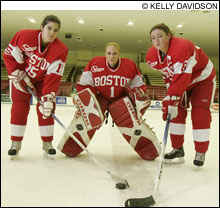 When Brian Durocher signed on to become head coach of BU’s first-ever varsity women’s ice-hockey team, he already understood that it wasn’t quite the same sport as the men’s version. For one, the mechanics are slightly different: disparities in wrist strength, for example, make renegade pucks a rare sight at women’s games. The chances of post-college play are far slimmer for women, which limits competition among teammates and the stress of dealing with agents. Most important, perhaps, “the emotions are different,” Durocher says. “The caring and the outright show of emotion.”
When Brian Durocher signed on to become head coach of BU’s first-ever varsity women’s ice-hockey team, he already understood that it wasn’t quite the same sport as the men’s version. For one, the mechanics are slightly different: disparities in wrist strength, for example, make renegade pucks a rare sight at women’s games. The chances of post-college play are far slimmer for women, which limits competition among teammates and the stress of dealing with agents. Most important, perhaps, “the emotions are different,” Durocher says. “The caring and the outright show of emotion.”
Durocher should know, since he’s spent time on both sides of the fence: after leading BU’s men’s team to a national championship as captain and goalie in 1978, he more recently served as the team’s assistant coach. He also spent time with women’s Olympic-hockey coach Ben Smith, whose 1998 US gold medalists jump-started the sport’s popularity in the States.
Given Boston’s reputation as a college-hockey mecca, it seemed odd that for 32 years, BU — home of the oft-victorious male Beanpot champions — lacked a varsity women’s ice-hockey team. The cause was fairly simple: lack of space. BU’s Walter Brown Arena opened in the early 1970s in part to house men’s hockey. Meanwhile, the women’s club team, established around the same time, practiced in a space the size of a “cubbyhole,” according to Durocher.
But all that changed last year, when BU opened its brand-new Agannis Arena. The men moved into that space, and BU finally had room to launch a Division I varsity women’s team (joining a full conference that includes teams from BC, Harvard, and Northeastern). They played their opening game in October, and their season ended last week.
Twenty-four young women were on the inaugural roster. Captain Cara Hendry, a junior transfer from Minnesota State University at Mankato, and other well-established talents transferred to BU for the chance to join the lineup. Durocher also recruited high-school players from across the country. And club players, who had waited patiently for the chance to show their stuff, assumed key roles on the team.
“The challenging thing for me, personally, is going from playing club to playing Division I hockey,” says Amy Ley, a 20-year-old junior defenseman who used to figure skate, then started playing ice hockey in high school. “One day I got the bright idea that it would be fun to put on all that equipment and hit people, so I did, and I loved it,” she says, adding of the switch from club to varsity: “It’s much more of a time commitment, and the level of play is much higher.”
Although their season ended last week with a bruising 6-0 loss to top-ranked University of New Hampshire (final overall record: 12-17-4; in the conference: 6-13-2), the female Terriers laid a solid foundation for growth. “I think for a first-year team that is primarily freshman, they did a tremendous job,” says David Riggs, one of two Daily Free Press sports reporters who covered the team this season.
The young Terriers (more than half the team was freshmen) had a strong start, with several wins and a surprise tie in October against archrival Boston College. Things got shakier mid-season, but earlier this month, BU ended a six-game losing streak by beating Northeastern in the women’s Beanpot consolation game (BC beat Harvard for the championship title).
It’s true that women’s hockey players exhibit a certain emotional dualism: they’ll slam opponents into the glass and, just moments later, huddle and hug after scoring a goal. High-running emotions can sometimes lead to “the usual girl-team drama,” admits junior forward Jessica Lortie, but it seems this group escaped that fate. “Even when we get back from road trips, a lot of girls still hang out together that night,” Lortie says.
After all, “we all have the same goals, and we’re trying to achieve something together,” says junior goalie Eden Spencer, who played on the club team during her freshman and sophomore years.
Indeed, the Terriers had a singular aim: to prove that they could run with the big dogs — and they did. “We have exceeded all expectations and broken the preconceived notions people had about this team,” Lortie says. “No one expected anything from us, and we have surprised a lot of people, to say the least.”